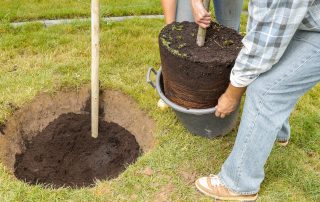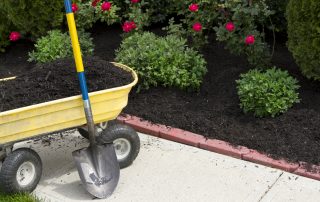Trust all of your commercial landscape tree planting to the professionals at Pugh’s Earthworks
Pugh's Earthworks Planting trees is always a major part of creating an attractive commercial landscape. However, if trees are not planted correctly, problems may arise. Selection of the proper tree is critical as you may want shade trees or you may want decorative trees or both. The certified landscape professionals at Pugh's Earthworks are trained on all facets of proper tree planting. It is pretty common knowledge that trees like other certain shrubs and grass are dormant during the winter. This is when the root growing season is at its best. Conversely in the summer, the foliage above ground is in full growth mode. Thus planting trees during the fall or early spring makes for a healthier tree and one that can withstand the high summer heat. Though you may want to plant the whole year round to keep your landscape looking beautiful, the weather is always a factor to consider that may stop you from doing so. That is because temperature extremes like severely cold or extremely hot are difficult for a new planting to handle. After all, they are just trying to take root and may be in shock with their new surroundings. Yes, plants, trees, and shrubs can undergo stress when placed in extreme conditions like excessive heat that occurs in the middle of summer. The heat can interfere with proper root development, causing the trees and shrubs to die. While you should avoid it, there are some ways to still do some planting in the middle of summer. First, do your planting in the evening and then water new plants after planting. You can also opt to do the planting on cloudy days. Then, use water bags and irrigation systems to ensure they have enough water so their roots can thrive even in the heat. The better times to plant trees and shrubs are early fall, late spring, and early summer. So, the next time to consider is early fall for your planting goals. It's a good idea to plant trees when they are dormant. Also, soak the shrub or tree in its pot before removing it to plant as this helps reduce the risk of damaging its tender roots. Provide good soil by adding a compost mixture and mulch after planting the tree or shrub. It can be challenging to plant trees and shrubs in a way that gives them a chance to grow and thrive. That is why we are here to help. Contact us today to learn more about our planting, landscaping, and garden maintenance services. Pugh's Earthworks Tennessee Commercial Landscape and Maintenance Services Pugh's Earthworks provides commercial landscape design and maintenance services throughout Tennessee, including Memphis, Jackson, and Nashville. We have five commercial landscape service operations in three states, including landscapes and service lawns and landscaping in Little Rock, Arkansas. Our monthly services include landscape design and maintenance, customized to your needs, budget, and seasonal situation. We have the highest level of dedication and commitment to quality which keeps Pugh's [...]




